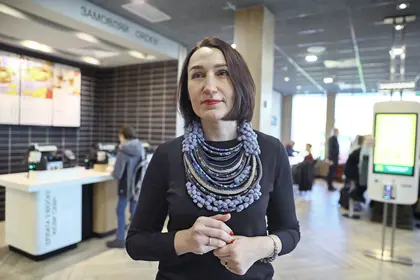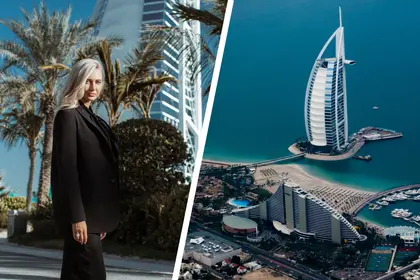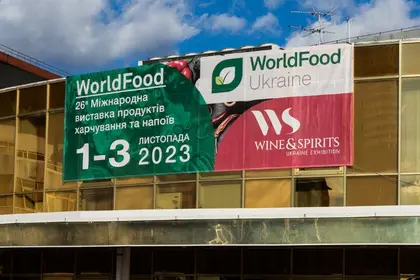Yuliya Badritdinova
Title: Managing director of McDonald’s Ukraine since March 2019
Nationality: Ukrainian
Age: 40
How to succeed in Ukraine: The secret of success is in giving people more than they expect and in being flexible, adapting to changes fast.
Every time Yuliya Badritdinova, 40, goes abroad, she always has a meal at McDonald’s fast-food restaurants. In Ukraine, she eats there every day.
For Badritdinova, this is not just an homage to fast-food. She not only works at McDonald’s, she has been head of its operations since March.
As a young graduate, Badritdinova wanted to work in the food industry, and she eventually did, occupying marketing posts in the international food and drink conglomerate Nestlé and the local Japanese chain Sushiya, before switching to McDonald’s Ukraine — first to head its marketing department and, then, the whole Ukrainian branch.
It turns out, Badritdinova always dreamed about working for the fast-food pioneer. Now she manages 90 restaurants across Ukraine and, by the end of 2020, there will be 100 of them. Unlike in the United States, where franchises dominate, the restaurants in Ukraine are part of the company.
Human touch
While McDonald’s global business suffers from controversies, its Ukrainian operations enjoy a shining reputation and the love of local clients. This creates a comfortable environment for Badritdinova.
Potential employees also abound, partly because McDonald’s allows people to choose how much they want to work during a week or a day. The company pays hourly.
A night-shift employee working 40 hours a week at a McDonald’s restaurant in Kyiv makes $610 before taxes a month, slightly less than an average salary in Kyiv, according to the company’s online salary calculator. The same job in Chernihiv, a regional capital of nearly 300,000 residents located 140 kilometers northeast of Kyiv, will earn $520 a month.
Badritdinova acknowledges that working at McDonald’s can be hard, but she says that the company “has a memorandum on human rights, which works on all the markets and includes our basic principles helping people not to forget that they are humans.”
Badritdinova says McDonald’s Ukrainian employees are satisfied and uncomplaining.
Badritdinova plays a noticeable role in Ukraine’s corporate life as a top local manager but also as a member of the board of directors at the American Chamber of Commerce in Ukraine, or ACC, where she’s in charge of the human relations committee.
The executive believes that McDonald’s teaches its staffers the things that “absolutely imperfect professional education” in Ukraine fails to do.
“Nowadays teaching is a major idea of progress. So, we have programs for teaching people not only to perform their work professionally but also teaching soft skills,” she says, meaning teamwork, peer-to-peer communications, self-organization, and trust.
McDonald’s currently only hires Ukrainians older than 18, but under the law, Badritdinova says, her company can employ Ukrainians as young as 16, an age group the manager wants to see among McDonald’s employees.
“The law allows it,” she says. “We will be working on it now.”
Importing french fries
McDonald’s imports 30% of its ingredients, and this is not likely to change to favor domestic products.
Although Ukraine boasts its agriculture, all the potatoes for McDonald’s French fries come from Poland, because there is “a big plant in Poland, which fully covers our needs for the number of restaurants we have in Ukraine.”
The chicken meat arrives from Germany, with Hungary as a backup.
The top suppliers in Ukraine include the U.S. meat processing holding OSI Group, which works with McDonald’s through its branch in Kozyatyn, a mid-scale town in Vinnytsya Oblast, some 200 kilometers south of Kyiv.
Mexican multinational bakery Grupo Bimbo sells buns to all McDonald’s restaurants in Ukraine from its facility in Dnipro, the regional capital of nearly 1 million residents located 500 kilometers southeast of Kyiv.
Adapting to the local market
McDonald’s main office is in Chicago, and Badritdinova has visited twice this year to draft the budget for its Ukrainian branch.
“They review our strategy and say that here you can do more, but there you might be too aggressive and underestimate the risks,” she said, explaining how the communication usually goes.
Badritdinova says McDonald’s builds its international expansion on trust.
“If the corporation picks up a general director in a certain country, it understands that things work well and are under control.”
The trust of the global management translates to freedom in local decisions, and local representatives are usually allowed to adjust McDonald’s global strategy to the local market.
Badritdinova believes that every country manager knows the best way to implement the tasks set by the headquarters in the United States.
For example, McDonald’s strategy includes delivery adjusted to a given market, but how the company launches it, what partners it gets on board, is up to local managers, Badritdinova says.
While the Ukrainian division doesn’t disclose its finances, in 2017 it estimated its investment in Ukraine at $225 million.
“Percentage-wise, we grow in single digits, speaking of visits,” Badritdinova says.
In 2018, Badritdinova’s predecessor Grzegorz Chmeliarski told the Ukrainian Retail Association that it takes from five to 10 years for one McDonald’s restaurant to recover its investment cost of around $1.5 million.
The company’s books took a blow in 2014, after the EuroMaidan Revolution drove President Viktor Yanukovych from power, triggering Russia’s ongoing war against Ukraine.
“We were falling really hard during the crisis years especially in terms of clients. People just stopped coming at one point.”
Everyone eats
Major Ukrainian cities will see more McDonald’s restaurants in the future. Any city with a population of more than 200,000 people is interesting for McDonald’s, Badritdinova says.
Even in Kyiv, there is room for growth.
“Delivery has its own radius. And we just need to deliver to the neighborhoods from where people are ordering,” Badritdinova says. “And this we can’t do if we do not have a restaurant in a certain radius.”
Therefore, the fast-food chain will continue opening new restaurants across Ukraine, including in Kyiv, Odesa and Kharkiv.
With such a business model, “anybody selling coffee and buns is our competitor, be it an international brand or a local one,” the executive says.
On the other hand, Badritdinova assures that McDonald’s “is not playing against the competition now, we are just developing the market.”
Introducing breakfast to the menu is an example of such market development, in Badritdinova’s view.
“Ten years ago, at eight in the morning, there were few places to find breakfast,” she says. McDonald’s spotted this opportunity and introduced its morning menu.
You can also highlight the text and press Ctrl + Enter







Comments (0)